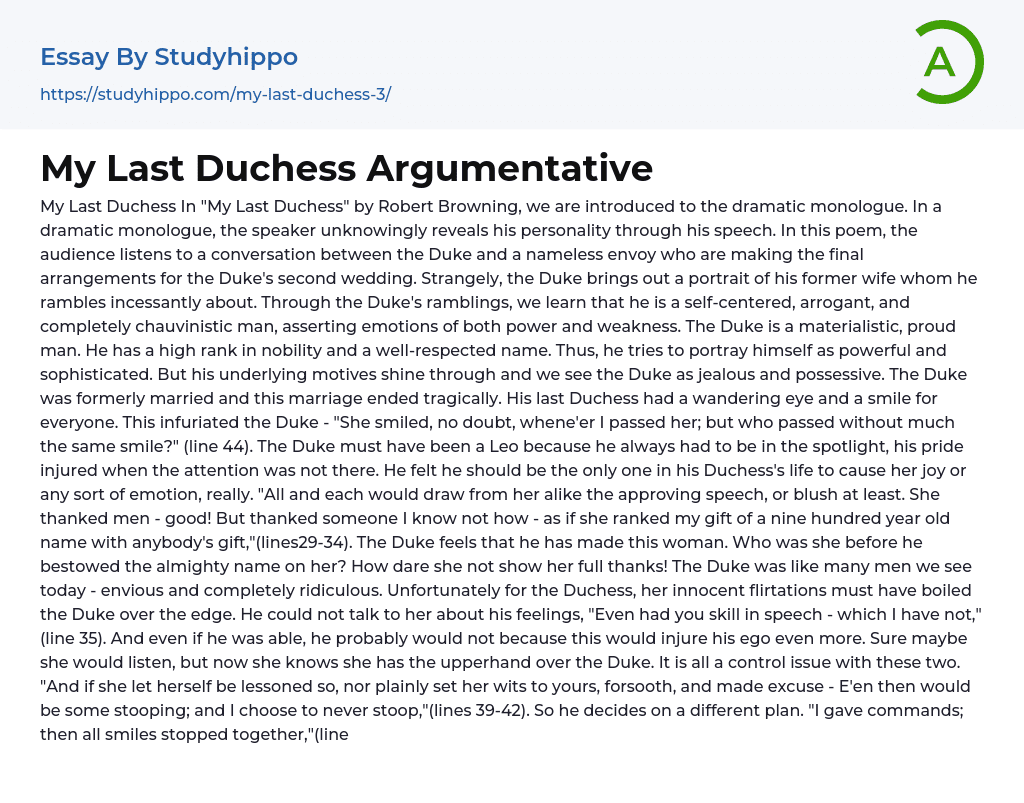My Last Duchess In "My Last Duchess" by Robert Browning, we are introduced to the dramatic monologue. In a dramatic monologue, the speaker unknowingly reveals his personality through his speech. In this poem, the audience listens to a conversation between the Duke and a nameless envoy who are making the final arrangements for the Duke's second wedding. Strangely, the Duke brings out a portrait of his former wife whom he rambles incessantly about. Through the Duke's ramblings, we learn that he is a self-centered, arrogant, and completely chauvinistic man, asserting emotions of both power and weakness. The Duke is a materialistic, proud man. He has a high rank in nobility and a well-respected name. Thus, he tries to portray himself as powerful and sophisticated. But his underlying
...motives shine through and we see the Duke as jealous and possessive. The Duke was formerly married and this marriage ended tragically. His last Duchess had a wandering eye and a smile for everyone. This infuriated the Duke - "She smiled, no doubt, whene'er I passed her; but who passed without much the same smile?" (line 44). The Duke must have been a Leo because he always had to be in the spotlight, his pride injured when the attention was not there. He felt he should be the only one in his Duchess's life to cause her joy or any sort of emotion, really. "All and each would draw from her alike the approving speech, or blush at least. She thanked men - good! But thanked someone I know not how - as if she ranked my gift of a nine hundred year old name with anybody's gift,"(lines29-34).
The Duke feels that he has made this woman. Who was she before he bestowed the almighty name on her? How dare she not show her full thanks! The Duke was like many men we see today - envious and completely ridiculous. Unfortunately for the Duchess, her innocent flirtations must have boiled the Duke over the edge. He could not talk to her about his feelings, "Even had you skill in speech - which I have not," (line 35). And even if he was able, he probably would not because this would injure his ego even more. Sure maybe she would listen, but now she knows she has the upperhand over the Duke. It is all a control issue with these two. "And if she let herself be lessoned so, nor plainly set her wits to yours, forsooth, and made excuse - E'en then would be some stooping; and I choose to never stoop,"(lines 39-42). So he decides on a different plan. "I gave commands; then all smiles stopped together,"(line 45). From this statement, we can infer that the Duke became enraged to the point he hired someone to kill his wife. It is one of those nice deals with power marriages - you do not listen to my command, you get blown away. Then we wonder why the divorce rate in America is 50%. All this has not changed the Duke, however. In this upcoming marriage, the Duke will act in the same way. That is the whole purpose in showing the envoy the portrait. It is a forewarning to what will happen to the next wife if she does not listen to her
master - she will end up living through a portrait on the wall. The Duke does not even care about the money he is making from this marriage, he only wants another young, beautiful woman to control. "The Count your master's known munificence is ample warrant that no just pretense of mine for dowry will be disallowed; though his fair daughter's self, as I avowed at my starting, is my object,"(49-52). Women are not people to the Duke, but rather creatures to tame, which he implies when he shows the envoy one of his other possessions. "Notice Neptune though, taming a sea horse, thought a rarity, which Claus of Innsbruck cast in bronze for me,"(54-56). The Duke was a women-thirsty, power-hungry man. He knew what he wanted and if he did not get it, he took drastic measures to insure his success in further endeavours. In this second marriage, he will either be jilted or have complete success for the envoy will go back with the story of the portrait and the Count will either hide his daughter or give her away without any qualms. If he does get left at the altar though, it would not even bother the Duke. He would just have more time to play his game of hunter and the little prey.




